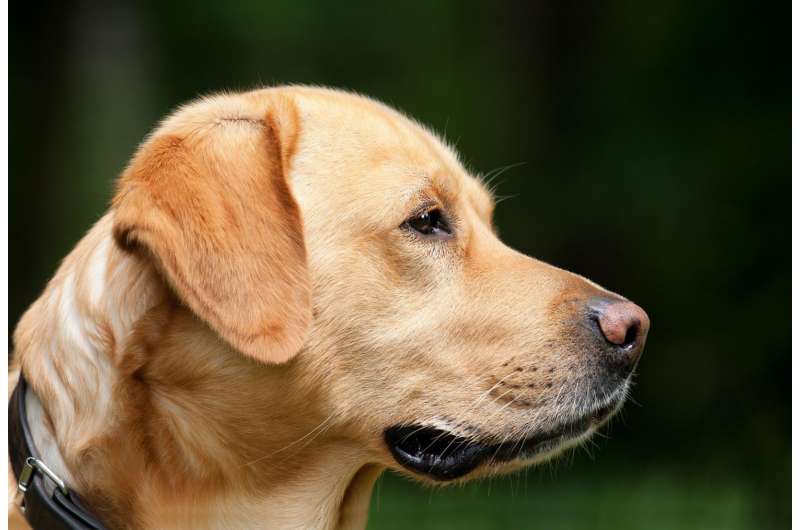September 29, 2016 report
Researchers get mixed results in training dogs to sniff out lung cancer in humans

(Phys.org)—A team of researchers at Krems University Hospital in Vienna Austria has found mixed results while conducting studies to determine the viability of using dogs to detect lung cancer in human beings. In their paper published in the Journal of Breath Research, the team describes their study and results and suggest ways of improving the performance of dogs used for such a purpose.
Dogs have made headlines over the past several years as some have alerted their owners to health problems that have sometimes turned out to be cancer—in some cases, actually saving their lives. Scientists believe dogs are able to smell some types of cancer by detecting chemicals expelled in the breath. In this new effort, the researchers sought to learn whether dogs might serve as a suitable tool for use in detecting lung cancer in people.
The experiment consisted of training six dogs of various breeds (which had all been trained in other sniffing skills such as finding people covered by snow in an avalanche) over the course of six months to respond to chemicals in the breath of human cancer patients. The dogs were then tested on their skills by exposing them to the breath of 122 human volunteers—29 of whom were lung cancer patients at various stages of treatment.
The researchers report mixed results—the dogs reported smelling cancer 78.6 percent of the time in the cancer patients, which was good, of course. But they also reported not smelling cancer in the breath of the cancer-free volunteers only 34.4 percent of the time. The study was conducted in a double-blind manner to eliminate bias, but doing so might have introduced errors by the dogs, the team reports, because it added extra stress. Dogs, they note, are also prone to distraction from a number of causes (boredom, fatigue hunger, etc.) which can also lead to errors. They believed that changing certain aspects of the testing environment might lead to a better outcome. Meanwhile, other researchers believe a better solution would be to create an artificial nose that is as sensitive as that of a dog to overcome the problem of using live animals.
More information: Klaus Hackner et al. Canine scent detection for the diagnosis of lung cancer in a screening-like situation, Journal of Breath Research (2016). DOI: 10.1088/1752-7155/10/4/046003
Abstract
The prognosis in lung cancer depends largely on early stage detection, and thus new screening methods are attracting increasing attention. Canine scent detection has shown promising results in lung cancer detection, but there has only been one previous study that reproduces a screening-like situation. Here breath samples were collected from 122 patients at risk for lung cancer (smokers and ex-smokers); 29 of the subjects had confirmed diagnosis of lung cancer but had not yet been treated and 93 subjects had no signs or symptoms of lung cancer at the time of inclusion. The breath samples were presented to a trained sniffer dog squadron in a double-blind manner. A rigid scientific protocol was used with respect to earlier canine scent detection studies, with one difference: instead of offering one in five positive samples to the dogs, we offered a random number of positive samples (zero to five). The final positive and negative predictive values of 30.9% and 84.0%, respectively, were rather low compared to other studies. The results differed from those of previous studies, indicating that canine scent detection might not be as powerful as is looked for in real screening situations. One main reason for the rather poor performance in our setting might be the higher stress from the lack of positive responses for dogs and handlers.
Journal information: Journal of Breath Research
© 2016 Phys.org














